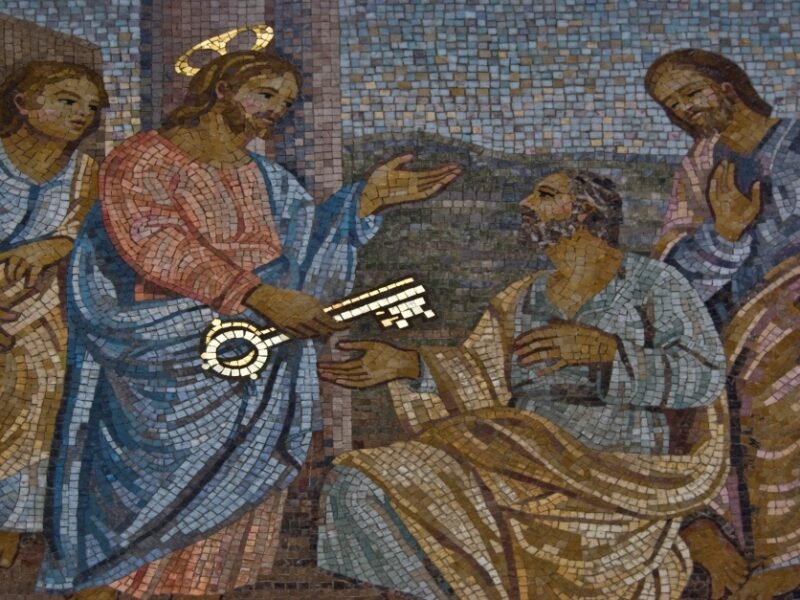While the Articles only mention the concept of merit de congruo by name in Article XIII, Browne explains the term earlier in his commentary on Article X:
[The school-authors] thought…that some degree of goodness was attributable to unassisted efforts on the part of man towards the attainment of holiness; and, though they did not hold that such efforts did, of their own merit, deserve grace, yet they taught that in some degree they were such as to call down the grace of God upon them, it being not indeed obligatory on the justice of God to reward such efforts by giving His grace, but it being agreeable to His nature and goodness to bestow grace on those who make such efforts. Endeavors, then, on the part of man to attain to godliness were by the schoolmen said to deserve grace de congruo, of congruity.
The key feature of merit de congruo as articulated here is that it is associated with “unassisted” works, that is, works done prior to or apart from the grace of God. This is how Browne continues to define the term in his discussion of Articles XI, XII, and XIII: “There was much discussion [at the Council of Trent] concerning works before grace, and merit de congruo; in which the Franciscans maintained, whilst the Dominicans denied, that good works could be done without the Spirit of God, and so merit grace of congruity” (Article XI); “We have seen that the schoolmen talked of good works, done without the grace of God, meriting grace de congruo” (Article XII); “Their doctrine is that a man, without any help from God, and by a strong effort of his own will, can so fulfil the commandments, as, though not of actual right, yet, on a certain principle of congruity, to draw down the grace of God upon him” (Article XIII). Article XIII rejects this notion that works done prior to or apart from grace “deserve grace of congruity.” To the contrary, such works “are not pleasant to God, forasmuch as they spring not of faith in Jesus Christ.”
The fact that the Article addresses this concept of merit de congruo suggests that it was common enough at the time the Articles were written to warrant a response. Notably, however, official Roman teaching appears to oppose this understanding of merit. According to the Council of Trent:
Whereas the Apostle saith, that man is justified by faith and freely, those words are to be understood in that sense which the perpetual consent of the Catholic Church hath held and expressed; to wit, that we are therefore said to be justified by faith, because faith is the beginning of human salvation, the foundation, and the root of all Justification; without which it is impossible to please God, and to come unto the fellowship of His sons: but we are therefore said to be justified freely, because that none of those things which precede justification-whether faith or works-merit the grace itself of justification.[1]
Trent also actively condemns those who teach that good works can be performed prior to or apart from prevenient grace:
If any one saith, that without the prevenient inspiration of the Holy Ghost, and without his help, man can believe, hope, love, or be penitent as he ought, so as that the grace of Justification may be bestowed upon him; let him be anathema.[2]
The same teaching is found in the more recent Catechism of the Catholic Church as well: “Since the initiative belongs to God in the order of grace, no one can merit the initial grace of forgiveness and justification, at the beginning of conversion.”[3] In light of such teaching, multiple contemporary Protestant treatments of Roman Catholicism take care to emphasize—as do a number of older commentaries on the Articles[4]—that even Romanists do not (at least officially) say that initial grace can be merited.[5] Indeed, if one were to consult only resources that exposit the Church of Rome’s formal doctrine, one could easily fall under the impression that the Article is attacking a strawman.
It is therefore crucial to notice that the Article rejects merit de congruo as taught by “the school-authors,” not the Roman Church per se. Prior to the Reformation, there were in fact medieval scholastics who articulated the concept of merit de congruo as it is found in the Article, including Odo Rigaldi, Alexander of Hales, the early Thomas Aquinas, and William of Ockham.[6] The conception of merit de congruo as understood by such medieval scholastics—and assumed by the Article—is markedly different from that of some latter-day commentators, whose thinking has presumably been influenced by the official Roman denial of the merit of unassisted works. One contemporary scholar characterizes merit de congruo as something that pertains to “the faithful’s good works,”[7] another supposes that it pertains to one who is already “responding to ‘the grace of God by Christ preventing us,’” which would mean that the Article actually opposes the idea that God “responds in any sense to the believer’s response to prevenient grace.”[8]
Traditionally, however, “merit de congruo” pertains to works prior to or apart from God’s grace, and it is this sense of the term as it was taught by some medieval scholastics that is condemned in Article XIII. The discrepancy between this older use and how it is understood in some recent sources is an object lesson in how the very same theological terms, maintained over centuries, can be used to mean completely different things. Moreover, it must be remembered that there is a difference between official teaching and informal teaching, the latter of which might be considerably different and more variable than the former, while still enjoying respect in virtue of the great learning and dignity of its purveyors.
Notes
- J. Waterworth, ed. and trans., The Canons and Decrees of the Sacred and Œcumenical Council of Trent (London: C. Dolman, 1848), Sixth Session, Chapter VIII, 36, https://history.hanover.edu/texts/trent/ct06.html. I say the Council of Trent appears to oppose merit de congruo because, as Browne observes in his commentary on Article X, “The decrees were drawn up, so as to displease either party [the Dominicans and the Franciscans] as little as possible, but with a leaning to the Franciscan doctrines.” See also Alister E. McGrath, Iustitia Dei: A History of the Christian Doctrine of Justification, 4th ed. (New York: Cambridge University Press, 2020), 326, 333‒35. ↑
- Waterworth, Council of Trent, Sixth Session, Canon III, 44, https://history.hanover.edu/texts/trent/ct06.html. ↑
- Catholic Church, Catechism of the Catholic Church (Vatican: Liberia Editrice Vaticana, 2012), par. 2010, https://www.vatican.va/archive/ENG0015/__P70.HTM. ↑
- J. Veneer, An Exposition on the Thirty Nine Articles of the Church of England, 2nd ed., vol. I (London: C. Rivington, 1734), 341; Edward Welchman, The Thirty-Nine Articles of the Church of England (London: SPCK, 1842), 36; A. P. Forbes, An Explanation of the Thirty-Nine Articles, 2nd ed. (Oxford and London: James Parker and Co., 1871), 208; Edgar C. S. Gibson, The Thirty-Nine Articles of the Church of England, 2nd ed. (London: Methuen & Co., 1898), 420; and Edward Arthur Litton, Introduction to Dogmatic Theology, ed. Philip E. Hughes (London: James Clarke and Col, 1960), 255. ↑
- Norman L. Geisler and Ralph E. MacKenzie, Roman Catholics and Evangelicals: Agreements and Differences (Grand Rapids: Baker Books, 1995), 226, and Gregg R. Allison, Roman Catholic Theology and Practice: An Evangelical Assessment (Wheaton, IL: Crossway, 2014), 420, 445. ↑
- McGrath, Iustitia Dei, 138, 165. Although Aquinas favors merit de congruo in his Commentary on the Sentences, his views change in the later Summa Theologiae (McGrath, Iustitia Dei, 139‒40). ↑
- Allison, Roman Catholic Theology and Practice, 420. Compare Joseph Pohle, “Merit,” in The Catholic Encyclopedia, vol. 10 (New York: Robert Appleton Company, 1911), https://www.newadvent.org/cathen/10202b.htm. ↑
- Oliver O’Donovan, On the Thirty-Nine Articles: A Conversation with Tudor Christianity, 2nd ed. (London: SCM Press, 2011), 81. ↑







'The Meaning of Merit De Congruo [Commentary on Browne: Article XIII]' has no comments
Be the first to comment this post!